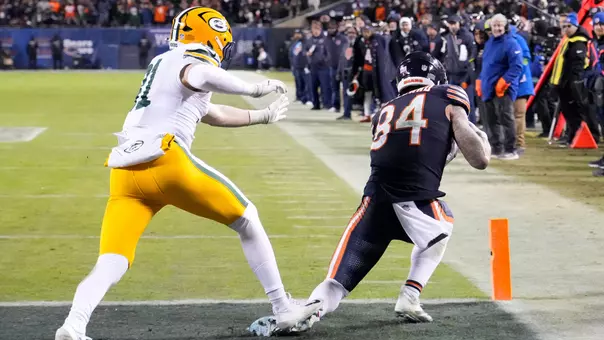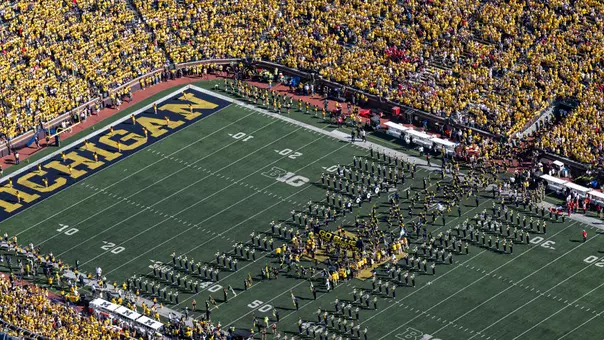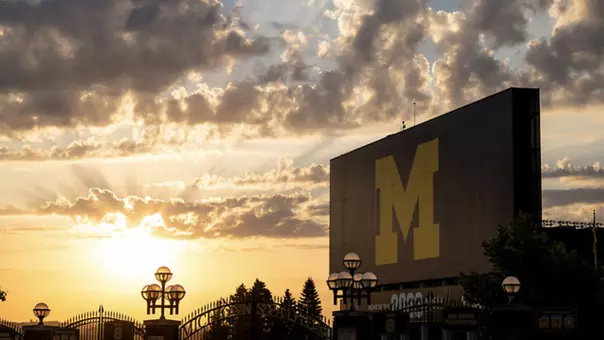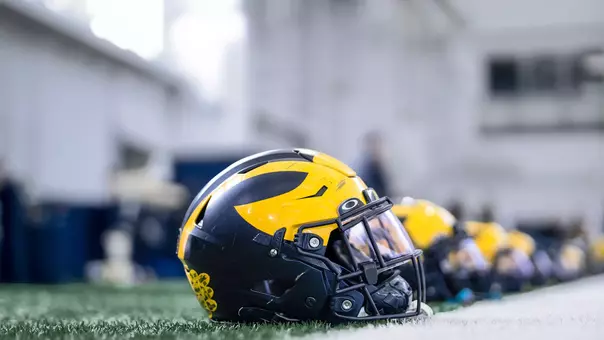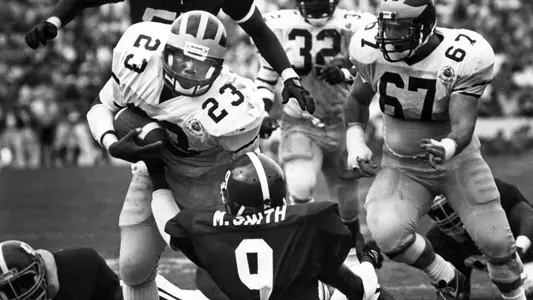
Kornacki: Michigan's Memorable Tampa Bowl Win 30 Years Ago
12/27/2017 10:20:00 AM | Football, Features
By Steve Kornacki
TAMPA, Fla. -- So much happened the first time the University of Michigan football team traveled here for a bowl game 30 years ago.
Legendary coach Bo Schembechler was back in Ann Arbor, recovering from quadruple-bypass heart surgery.
Offensive coordinator Gary Moeller, who succeeded Schembechler as head coach two years later, served as interim coach for what was still called the Hall of Fame Bowl on Jan. 2, 1988.
There was a wild finish to a Michigan victory over Alabama, and the whole team sang "The Victors" for Schembechler, who was called on the phone to become part of the locker room celebration.
Tailback Jamie Morris, who rushed for a career-high 234 yards and three touchdowns to earn MVP honors, jumped into the arms of John Kolesar, who made the game-winning touchdown catch in a 28-24 triumph.
One of the starting defensive linemen for the Wolverines, a redshirt freshman named Warde Manuel, took part in all of it.
Thirty years later, Manuel returns as the athletic director of his alma mater, which will play South Carolina Monday (Jan. 1) in a game now called the Outback Bowl.
I joked with Manuel about knowing all along this scenario would occur three decades later.
"That was in the plans," Manuel said, smiling. "I had a crystal ball somewhere. And so the Outback Bowl has this special feeling for me. It was the first bowl game I'd ever played in. It was just a great experience down there as a student-athlete.
"I went back as an (athletic department) administrator in 2003, and now to go back as the athletic director for the 2018 Outback Bowl is very special."
Schembechler, who had heart surgery 18 days earlier, got to celebrate with his team that afternoon.
"It was unbelievable," said Manuel. "Obviously, Coach had the heart attack and then the surgery. And then, just to hear his voice, and sing 'The Victors' with him as he was patched in, was a special moment."

Manuel makes one of his three tackles against Alabama
Morris wrote "BO" on the tape around his wrists before the game.
"But I covered it up with a wristband because I didn't want anyone to see it," said Morris. "Mo said before the game, 'When we win, we're going to call Bo and make him happy.' It was great when we made that call to him after the game. We said, 'Happy New Year!' We sang 'The Victors' and then I was fortunate to actually talk to Bo privately.
"I said, 'I want to thank you for giving me the opportunity to represent this university and taking a chance on a 149-pound freshman. I never wanted to let you down, and I hope that I never let you down.' He said that I never let him down and told me that he loved me, and said, 'When you get back, come and see me.' Then he laughed and said, 'You got me a win on my record.'"
Morris became more than Schembechler ever envisioned. He also was an accomplished receiver and kickoff returner, and he remains the No. 1 career all-purpose yardage leader at Michigan with 6,201. Morris rushed for a school-record 1,703 yards in 1987 and finished with the career rushing record of 4,392 yards, marks since surpassed.
Moeller was keenly aware that Morris had Schembechler on his mind in Tampa.
"Bo had gone through so much pain," said Morris. "He had gallstones and then has the heart attack, and we were going to the bowl game without our coach. Now, don't get me wrong, Coach Moeller did a great job. He got us ready and at times would tell me, 'I know where your head is today. It's not here. Now, get your ass ready and stop thinking about Bo. Bo is going to be fine.'
"But before we left for Tampa, the seniors went to visit Bo at his house. He's got tubes coming out of him, and he looks at me and says, 'I expect us to win.' And I looked at him and said, 'Don't worry. You just get better. Don't worry, Coach. We got this.' He said he heard practices were going well and looked at me and (safety) Doug Mallory, the other captain. He smiled and said, 'I trust you. Now, you go down there and make sure these players act like Michigan!'"
Michigan's long-time running backs coach also put Morris on a mission.
"Coach (Tirrel) Burton told me, 'You've got to show America. You're got to show everybody how good you really are.' I tried to figure out what I had to do."
What he did was rush for more yards and as many touchdowns as he'd ever had in one college game. Morris averaged 10.2 yards per carry and scored on a 77-yard run.
"You have to watch the tackle's (rear end)," Morris said of his career-long run to pay dirt. "When Jumbo Elliott turned out toward the sideline, I went outside of him. I didn't follow the fullback because Jumbo got his guy. I ran by Jumbo and the linebacker and could not believe how wide open I was."
During the NBC TV telecast, Ahmad Rashad, a former NFL star, noted that Morris had an "excellent relationship" with his offensive linemen.
"He always picks the right hole," said Rashad. "He follows his blockers perfectly and then turns on the speed at the right time."
It was a case of a senior tailback running behind an all-senior line consisting of center John Vitale, guards David Chester and Michael Dames, and tackles Mike Husar and Elliott, an All-American that season. The tight ends were juniors Derrick Walker and Jeff Brown, and freshman guard Dean Dingman and sophomore tackle Tom Dohring also contributed before becoming dominant blockers.
"We grew up together," Morris said of his veteran linemen.
Still, Morris was not going to be enough to win. Some last-second passing magic was required by Michigan quarterback Demetrius Brown, who was 3-for-12 for 52 yards before becoming a hero.
Brown dropped back to pass on fourth-and-three at the Alabama 20-yard line on a do-or-die play with less than one minute remaining. He felt pressure and couldn't find the receiver on a short route, and so the lefthander double-pumped and dropped a pass into the left corner of the end zone for all the marbles.
Kolesar came back to catch it despite tight coverage from cornerback John Mangum, who would become an All-America selection the next season.
"I saw the ball in the air," recalled Manuel, "and I saw Kolie catch the touchdown, and it was obviously a great feeling to win that game in the last seconds."
Rashad, while describing the replay, said: "He's actually covered there!"
Morris ran toward Kolesar as he returned to the sideline and jumped into the arms of the big-play receiver. Kolesar carried Morris (5-foot-7, 183 pounds) a few strides, and Morris raised his right arm in triumph, signaling No. 1 with his ring finger.
"That kid saved our bowl!" Morris said of Kolesar. "And that one win saved a lot of things for us that season. We lost other games that we shouldn't have lost (finishing at 8-4). And next year, they went on to do great things. That catapulted that team."
The Wolverines won the Rose Bowl the next season, en route to five consecutive Big Ten championships.

Left: Kolesar (40) celebrates with fellow receiver Chris Calloway after scoring the winning touchdown. Right: Moeller and Schembechler during the 1987 season.
Schembechler, who coached two more seasons, was beside himself after Kolesar came down with the ball in the end zone.
"When that happened, I flew off that couch," Schembechler said later in a TV interview. "I couldn't believe what happened there. That was a great experience."
That game marked the first time Michigan and Alabama met on the gridiron, and it was the second bowl game played in Tampa Stadium, nicknamed "The Big Sombrero" by ESPN's Chris Berman for its resemblance to the high-crowned hat popular in Mexico.
It ended with Alabama quarterback Jeff Dunn dropping back to fire his 40th and final pass of the game and having cornerback David Arnold intercept it and run 36 yards down the left sideline as the final gun sounded.
Cornerback Allen Bishop had a career day with 18 tackles (15 solos) and All-America defensive end Mark Messner made three tackles, one for lost yardage, and forced a fumble.
Manuel made three tackles in what would be his final start in a football game. He said spinal stenosis in his seventh and eighth vertebrae ended his promising career, and he focused on track and field after that.
"I played some the next year," said Manuel, "but the problem with the vertebrae caused me burners on a consistent basis. I had to give it up."
However, he and his teammates finished that season with a bang in Tampa.
"It was just a great team effort," said Manuel. "The first quarter, I believe we were on the field for 12 of the 15 minutes defensively. We weren't performing to the best of our abilities, but we turned that around. The offense started to control the ball."
Morris said the practices in Ann Arbor were hard, but he credited Moeller with making a crucial adjustment in Tampa, where it was 72 degrees on game day.
"He let us rest our legs because it was hot," said Morris, who played three seasons in the NFL and now hosts "The M-Zone Show" on WTKA (1050 AM), Monday through Friday, from 3 to 6 p.m. "I think that was a big plus. And he kept us focused by talking about winning."
Manuel said, "I just remember the team and the effort that we made against that great Alabama team. The defense was on the field for 90 plays, and they had a dynamic running back (Bobby Humphrey) who was just amazing (rushing for 149 yards and two touchdowns). It was a great team battle. That's what I remember."
They overcame plenty in that game, including a 16:36 disadvantage in time of possession, and used it as a springboard to greatness.
Editor's Note: Steve Kornacki of MGoBlue.com covered the 1988 Hall of Fame Bowl for the Ann Arbor News and then wrote about five consecutive Michigan Big Ten championship teams for the Detroit Free Press.

